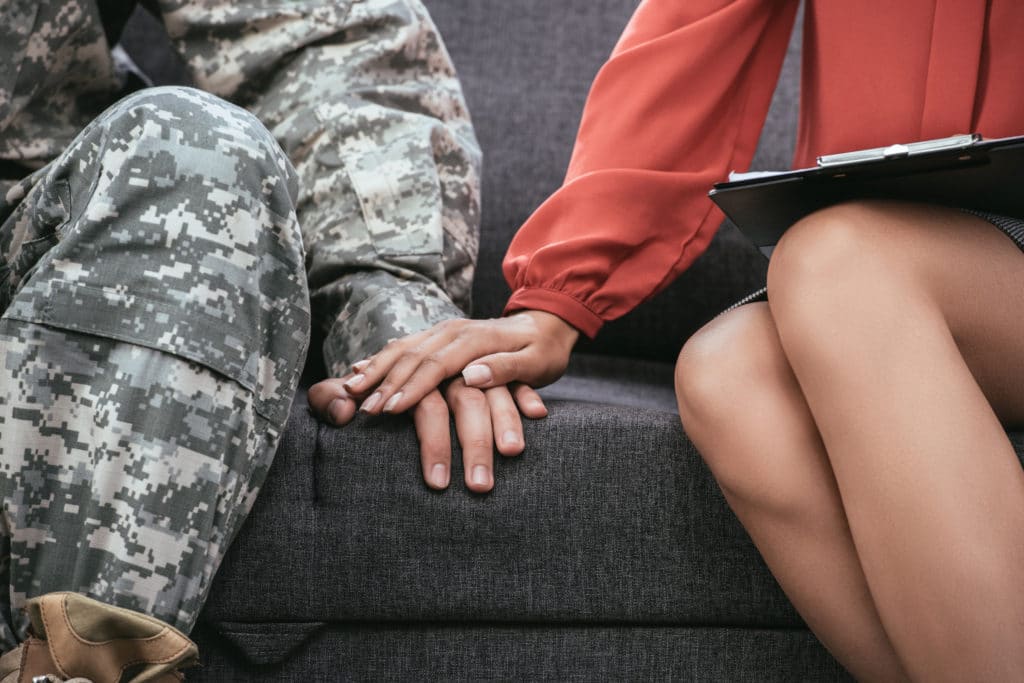PTSD and the Children of Veterans
PTSD not only affects veterans, but the families of veterans also can feel its “aftershocks” and suffer. Children first must cope with the stress of a military parent’s deployment, then a prolonged absence, and finally with their return.
Studies of returning service members and veterans have found the following rates: 12% to 25% for PTSD, 4% to 14% for depression, 11% to 19% for traumatic brain injury, and 18% to 35% for any mental health risk or concern.
Common symptoms of PTSD
Common symptoms of PTSD are depression, suicidal thoughts, substance abuse, problems with memory and cognition, flashbacks, and feeling emotionally numb. The disorder has been associated with occupational instability, marital problems, difficulty in parenting and family discord. The difficulty these veterans have experiencing emotions and their sense of detachment may make it difficult for them in their personal relationships, and may even lead to behavioral problems on the part of their children.
Forty-three percent of active duty service members have children. These children face the challenges inherent in having a parent deployed and many of them must cope with living with a parent who returns profoundly changed by war. These symptoms can be frightening not only for the individual experiencing them, but also for children who witness them. Children may not understand what is happening or why, and they may start to worry about their parent’s well-being. They may also worry that their parent cannot properly care for them when that parent is avoiding places that trigger upsetting memories.
Karon Cook, president of the Kansas Department of the American Legion Auxiliary, claims,
“20 percent to 25 percent of children whose veteran-parent has committed suicide or suffers from PTSD think about taking their lives. The veterans get help but the VA doesn’t have a program specifically for the children.”
Family therapy
Family therapy can offset these problems and address recovery concerns. Children may benefit from individual therapy as well, with variations based on the child’s age and development. Each family is unique; the most important thing is to help each member of the family, including the children, have a voice in expressing what he or she needs. Speak to a health care professional for more information.
https://cjonline.com/news/local/2014-03-29/military-children-often-feel-aftershock-parents-ptsd
https://www.ptsd.va.gov/professional/treatment/family/pro_deployment_stress_children.asp
Getting federal approval to research marijuana is a laborious and long process. While the federal government approves and funds many studies that look into the negative effects of cannabis, it has been reluctant to approve those that consider the positive effects. This has created controversy over medical research by creating a Catch-22 situation concerning medical marijuana.
Marijuana is classified as a Schedule I substance under the federal government’s Controlled Substance Act, meaning it is too high-risk for abuse and has no accepted medical applications.
DEA representative Matt Barden said recently:
“In regards to medical marijuana, the DEA of course recognizes the pain and suffering of individuals with serious illness and their need for medication. However, the FDA has repeatedly concluded that marijuana has a high potential for addiction and has no acceptable level of medical use.”
Marijuana research advocates argue that if the federal government were to allow and fund medical marijuana research on a large scale, it would have the evidence it needs to reclassify the drug.
Medical marijuana
Veterans, medical marijuana activists and scientists welcomed the first federally approved research into pot as a treatment for post-traumatic stress disorder (PTSD). Controversy erupted recently when the university conducting the research decided to cancel the project after clearing four years of bureaucratic hurdles. This created a backlash of protest by veterans and their families who were hopeful for positive results with the research since PTSD affects up to 20 percent of those who served in the Afghanistan and Iraq wars.
Professor Yosef Sarne of Tel Aviv University’s Adelson Center for the Biology of Addictive Diseases, based at the Sackler Faculty of Medicine is also studying medical marijuana. Results revealed that medical marijuana includes qualities that could protect the brain from long-term damage after a traumatic injury. The protective effects come from the cannabinoid THC (or tetrahydrocannabinol), the major psychoactive component in the cannabis plant. This implies that medical marijuana might one day help reduce the risk of brain damage after critical surgery. It is thought that THC decreases the levels of free radicals and chemicals that induce inflammation after injury and increases the blood supply to the brain.
Medical marijuana advocates contend that suffering people should not have to wait for scientific research to catch up to patients’ needs. Physicians and patients need to consider all the risks before deciding on any treatment especially one that is controversial. Since a growing number of states are now allowing medical marijuana use, research must be allowed to determine the real medical uses and relative safety levels of marijuana and its component elements.
The Best Call You Will Ever Make
Call Now to Speak Confidentially with an admission counselor.
https://link.springer.com/article/10.1007%2Fs00221-012-3186-5
